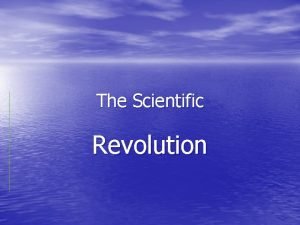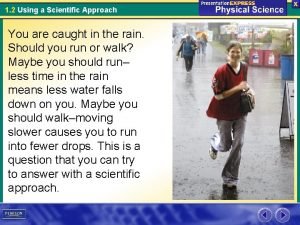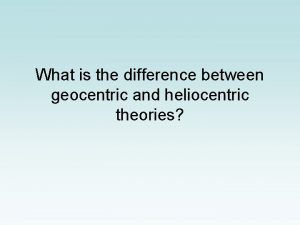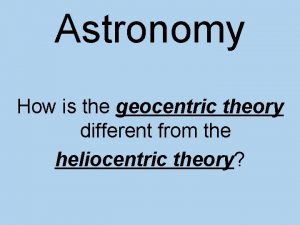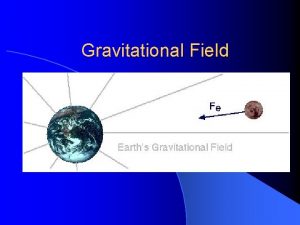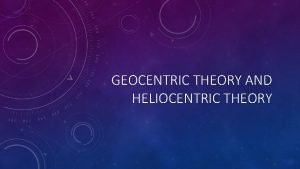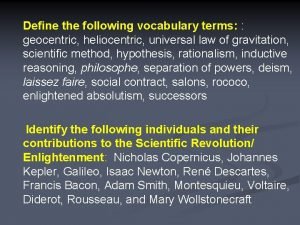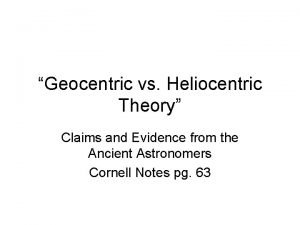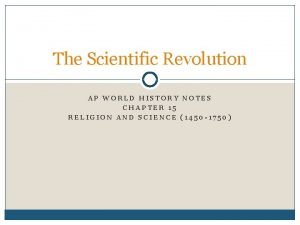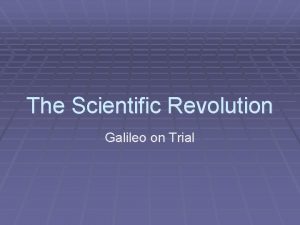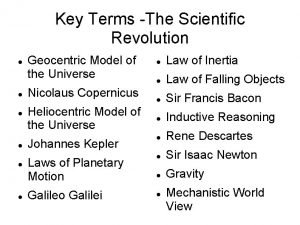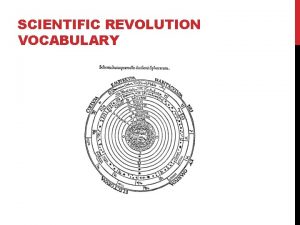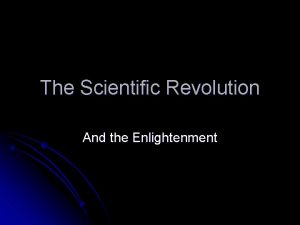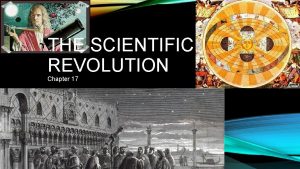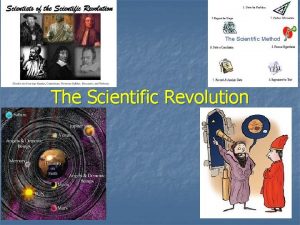The Scientific Revolution Ptolemys Geocentric Theory A New













- Slides: 13

The Scientific Revolution

Ptolemy’s Geocentric Theory

A New Way of Thinking Clockwise from top left is a collage of Kepler, Copernicus, Newton, Galileo, Descartes, and Ptolemy. (Images courtesy of the Library of Congress and NASA. )

Copernicus’s Heliocentric theory

n The idea of Copernicus was not really new! because he added the ideas of Aristarchus who put the sun at the center of the universe, and his own observations. Indeed a sun-centered Solar System had been proposed as early as about 200 B. C. by Aristarchus of Samos (Samos is an island off the coast of what is now Turkey). However, it did not survive long under the weight of Aristotle's influence and "common sense": One of the questions raised by Aristotle was : if the Earth is actually on an orbit around the sun, why wasn't a parallax effect observed? That is : stars should appear to change their position with the respect to the other background stars as the earth moved about its orbit, because of viewing them from a different perspective. Indeed this objection is valid, but failed to account for what we now know to be the enormous distances to the stars. The parallax effect is there, but it is very small because the stars are so far away that their parallax can only be observed with very precise instruments which were only invented in the 19 th century. Thus, the heliocentric idea of Aristarchus was quickly forgotten and Western thought stagnated for almost 2000 years as it waited for Copernicus to revive the heliocentric theory.

Kepler inserts mathematics and elliptical orbits to Copernicus’s basic ideas

With sincere heart and unpretended faith I abjure, curse, and detest the aforesaid errors and heresies [of Copernicus] and also every other error… contrary to the Holy Church, and I swear that in the future I will never say or assert…anything that might cause a similar suspicion towards me. -Galileo Galilei


Francis Bacon

Rene` Descartes “ I think, therefore I am”

Sir Isaac Newton

Scientific Instruments F = 9/5 C + 32.

Discoveries in Chemistry and the Human Body/Medicine
 With sincere heart and unpretended faith
With sincere heart and unpretended faith Heliocentric vs. geocentric
Heliocentric vs. geocentric How is a scientific law different from a scientific theory?
How is a scientific law different from a scientific theory? What is the difference between heliocentric and geocentric?
What is the difference between heliocentric and geocentric? Geocentric model
Geocentric model Geocentric theory facts
Geocentric theory facts Define geocentric theory
Define geocentric theory Define geocentric theory
Define geocentric theory Geocentric theory definition world history
Geocentric theory definition world history Russian revolution vs french revolution
Russian revolution vs french revolution You should hope that this game will be over soon
You should hope that this game will be over soon Third agricultural revolution definition
Third agricultural revolution definition Chapter 6 section 1 the scientific revolution
Chapter 6 section 1 the scientific revolution Scientific revolution ap world history
Scientific revolution ap world history
